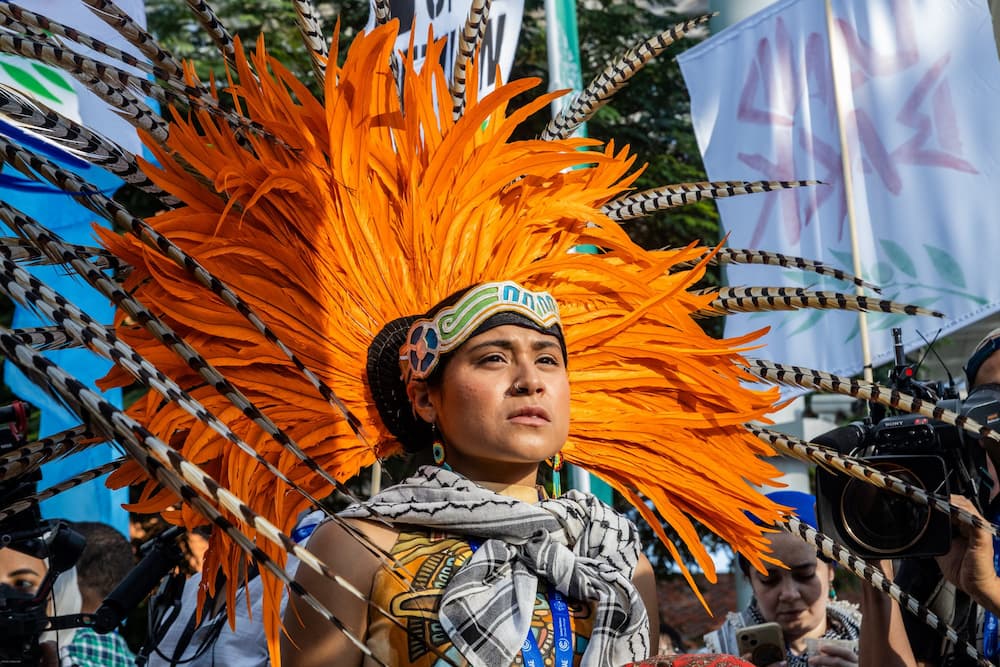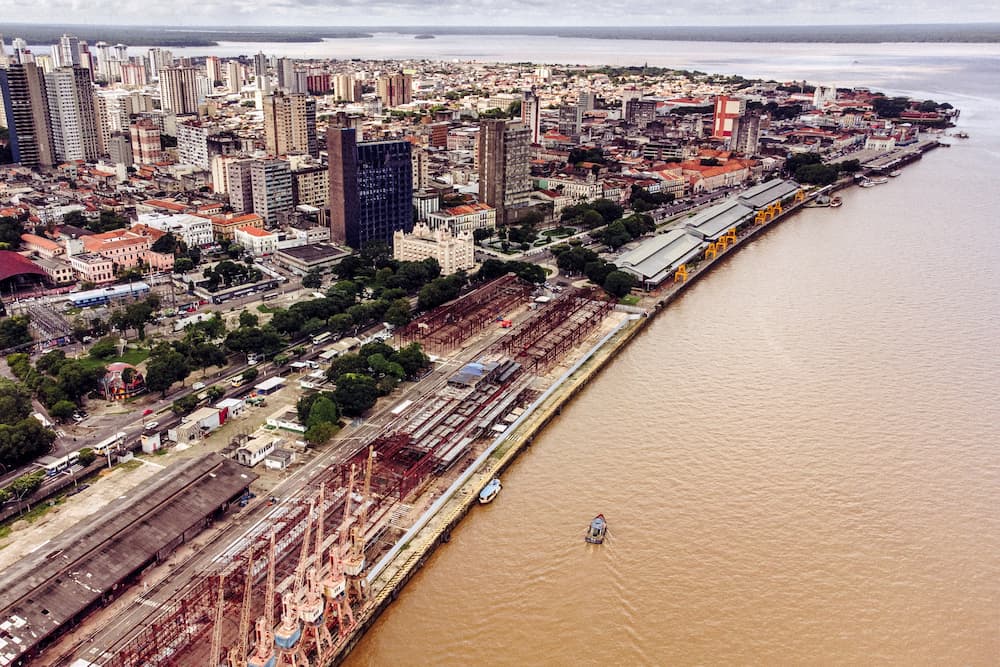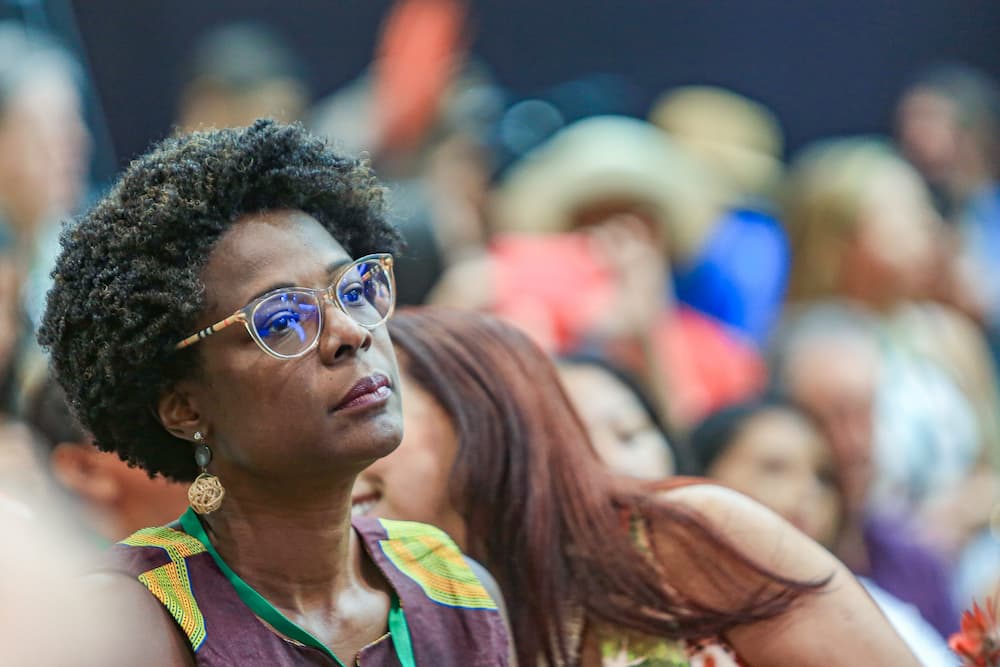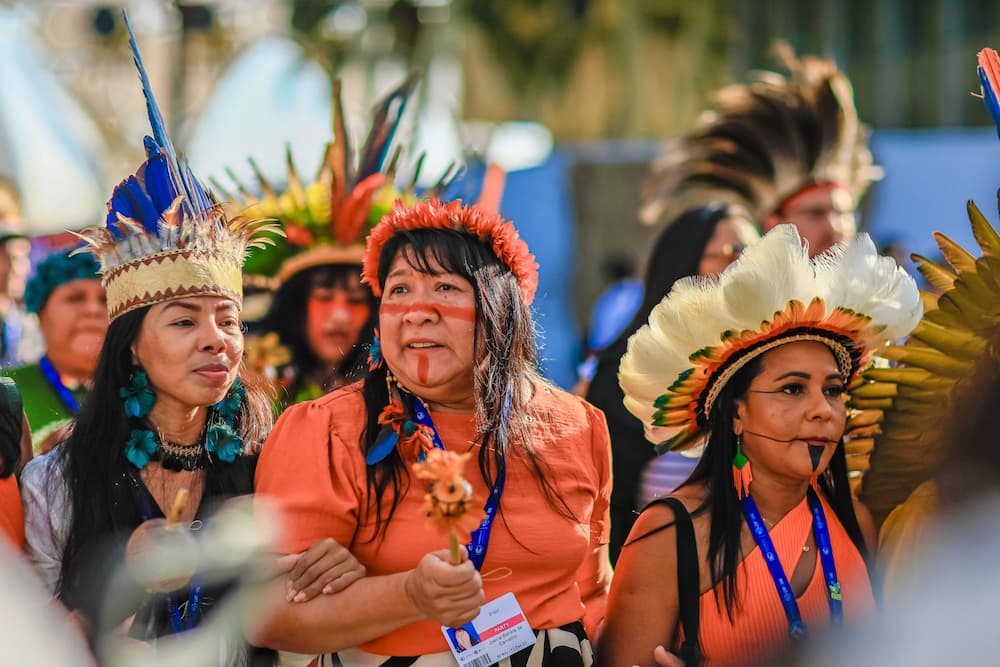Hopes of real civil influence at November’s UN negotiations in Belém are being undermined by costs, bureaucracy and mixed messaging

An Indigenous activist during demonstrations at the COP28 opening in Dubai, 2023. Civil society organisations called for an end to oil extraction, the protection of ecosystems and a ceasefire in Palestine (Image: Mídia NINJA / Flickr, CC BY NC)
The COP30 climate summit is one of the most eagerly awaited UN events in recent years. Both the conference’s president, André Corrêa do Lago, and its executive director, Ana Toni, have repeatedly championed civil society during the build-up. Speaking earlier this year, Corrêa do Lago made a point of inviting civil society to participate in the summit, which takes place in Brazil’s Amazonian city of Belém in November.
After decades of what many environmental activists regard as lethargy in the negotiation processes, Corrêa do Lago sees popular pressure as the answer to transforming the conservative positions of the parties involved. “If there isn’t a great involvement of civil society, of the most varied actors, it’s very difficult for governments to do their best,” he said in an interview with Amazonian journalism platform Sumaúma in March.
Being at the COP and demonstrating is a right, not a gift given by the Lula government
- Savio Carvalho, head of regions for 350.org
The contrast with recent COPs is striking. For the past three years, they have been hosted by countries whose authoritarian regimes severely restrict the rights to freedom of expression and protest. According to observer organisations, the repression of activists and human rights violations limited the participation of social movements. Demonstrations typically held in a variety of public areas, such as those seen at COP26 in Scotland, were typically restricted to spaces governed by the UN Framework Convention on Climate Change (UNFCCC).
By contrast, the Brazilian government and the COP30 presidency have established a technical working group specifically tasked with strengthening social participation in the summit. Another initiative designed to achieve this aim is the People’s Circle, one of COP30’s four Leadership Circles. Its stated objective is to increase the presidency’s “capacity to listen to the demands and contributions of Indigenous peoples, traditional peoples and communities, and Afro-descendants.”
Stela Herschmann, a climate policy expert for Brazilian civil society group the Climate Observatory (CO), welcomes the country’s willingness to engage in dialogue. But she also has misgivings about these circles and working groups: “We still don’t know clearly how these initiatives will work in practice. And, in the end, they will inform the COP presidency, not the formal UNFCCC negotiating process.”
For activists like Savio Carvalho, head of regions for the civil activism group 350.org, Brazil is doing no more than its duty. Although the level of restriction on social participation has varied throughout the history of the COPs, he believes that the experience of the past three years has cultivated romanticism regarding COP30. “Being at the COP and demonstrating is a right, not a gift given by the Lula government,” Carvalho tells Dialogue Earth.
The high costs of participation
Beyond the expectation of greater social participation, the exorbitant price of accommodation in Belém has also pushed COP30 into the headlines. Lack of beds has inflated prices, which in at least one reported case have reached BRL 2 million (USD 354,000) to stay for the full two weeks of the event. Other logistical obstacles to reaching the city, such as the high cost of flights – even within Brazil – jeopardise access, and the inclusive sentiments expressed by COP30’s organisers. According to 350.org, even organisations from the Amazon and Belém’s state of Pará have expressed financial and logistical difficulties in taking part in the conference.
In late March, the government’s special secretary for COP30, Valter Correia da Silva, told Sumaúma that exploitative accommodation prices could be criminalised. He stated his intention to establish reasonable rates among those offering accommodation, and to communicate the lasting damage that COP price-gouging could do to Belém’s tourism economy.

A view of building works at Porto Futuro in Belém, Brazil. The exorbitant price of accommodation and flights to the city during COP30, as well as other logistical obstacles, jeopardise access to civil society (Image: Christian Braga / Dialogue Earth)
The federal government’s promises to centralise reservations and mitigate abusive practices have so far failed to materialise. “To this day, most of us don’t know where we’re going to stay,” says Carvalho. He calls the contradiction between defending social participation and allowing values that make it unfeasible, a scandal. “Is this how Brazil intends to welcome civil society?”
This scenario has been exacerbated by the reduction in international funding for the climate agenda. The United States’ suspension of trillion-dollar aid funding for non-governmental organisations and social welfare programmes around the world has been particularly detrimental.
For Alisi Rabukawaqa-Nacewa, a Fijian activist and representative of 350.org’s Pacific Climate Warriors network, the difficulty of accessing funding makes for a difficult choice: the cost of attending a COP from the Pacific Islands is always high, but climate inaction is even more expensive.
“When we manage to access funds, the question is: should we be physically at the COP, to make sure we’re not forgotten, or should we invest in local actions with tangible results?” she explains.
Attendance is no guarantee of results
In recent years, the COPs have grown dramatically. From less than 5,000 participants at the first summits in the mid 1990s, attendance jumped to around 30,000 at COP21 in 2015, which produced the Paris Agreement. Nearly 84,000 attended COP28 in Dubai. For Herschmann, this trend is a healthy reaction to the worsening of the climate crisis.
Without the right to vote, society can only monitor and try to influence the positions of the parties involved. Calls for these COPs to host lower numbers have been growing, however, and reaching Belém does not guarantee COP30 participation. Access to the so-called Blue Zone, where the negotiations take place, is only given to non-governmental and intergovernmental organisations if they are registered with the UNFCCC as observers. And the restrictions don’t stop there: once inside the Blue Zone, access to the negotiating rooms and their speaking spaces is limited.
The bureaucratic process to become an observer ultimately excludes many local organisations. “Every year, new organisations apply to become observers, and the waiting list can reach up to four years,” says Herschmann.
At the same time, the number of oil industry lobbyists in attendance has exploded. At COP28, they numbered 2,450, more than most national delegations. At COP29, in Baku, there were 1,773 industry representatives. But there were also more than 130 members of organisations promoting climate disinformation, according to a survey by Important Context, a project of US non-profit the Accountability Journalism Institute.

Civil society representatives attending parallel sessions at the Amazon Summit, in Belém, 2023. The conference brought together leaders and ministers from Amazonian countries, but frustrated observers with its lack of commitments to protect the rainforest (Image: Palácio do Planalto / Flickr, CC BY ND)
“These are groups whose interests are at stake, in the most pejorative sense of the phrase,” says Herschmann, conflicts of interest should be considered, especially when demand for accreditation outstrips supply. “After all, that’s where the cause of the problem and the delay in the solution come from.”
Pressure from the streets
The Indigenous peoples of the Amazon have been demanding the co-presidency of the event for months. The demand was presented in February in a letter to Corrêa do Lago from the Coordination of Indigenous Organisations of the Brazilian Amazon (Coiab). It was then given new impetus in April during the Free Land Camp (ATL), the largest annual mobilisation of Brazil’s Indigenous peoples, held in Brasilia.
This Indigenous articulation prompted the creation of the Alliance between the Indigenous Peoples of the Amazon, the Pacific and Australia, and the delivery of another open letter to the COP30 president. Among its demands is the participation of their leaders in the climate negotiations, on an equal footing with heads of state.
The response has come in the form of government initiatives. For example, the creation of the International Indigenous Commission, which aims to increase representation at COP30 debates of the Indigenous peoples of Brazil and beyond.
Dialogue Earth spoke to the activist and sociologist Sila Mesquita, who coordinates the Amazon Working Group Network, a union of more than 600 grassroots organisations advocating for a paradigm shift on Amazonian human development. Mesquita says government-led initiatives are not enough to ensure independent participation, or true representation of civil society interests: “We need to remember that civil society is civil society, and government is government.”

Joenia Wapichana (centre), Brazilian lawyer and former federal deputy, taking part in an Indigenous peoples’ demonstration at COP28 in Dubai (Image: Estevam Rafael / Palácio do Planalto, CC BY ND)
Mesquita is part of the People’s Summit, a parallel event to COP30 that will focus on climate justice. “Our movement is a counterpoint to the official discourse of the COP and the government,” says Eunice Guedes, coordinator of a social movement called the Articulation of Brazilian Women (AMB).
According to the People’s Summit, more than 500 organisations (national and international) have already confirmed attendance. It is expected to gather as many as 30,000 people at Belém’s Federal University of Pará. Together they will confront issues including just energy transitions, zero-deforestation policies and corporate accountability for global heating.
In addition to the discussions of the People’s Summit, its organisers are pushing for more ambitious climate targets, and an end to the presence of fossil fuel lobbyists at the COPs.
Herschmann says civil society action in the Blue Zone will not be enough, considering the geopolitical context of wars, escalating economic tensions and a growing distrust of multilateralism. She says protests around the city will be crucial to moving the needle in negotiating rooms: “The pressure of the street has a much greater volume – of people and decibels.”
So far, the Pará government has given worrying signals on how it will respond to November’s social mobilisations. In February, Indigenous people who occupied Belém’s State Education Secretariat building in protests linked to the sector were met with a power cut and pepper spray.
Regarding the place that civil society will have during COP30, Carvalho says: “It’s still too early to say anything.”
This article was originally published on Dialogue Earth under the Creative Commons BY NC ND licence. Read the original article.
.jpg)





